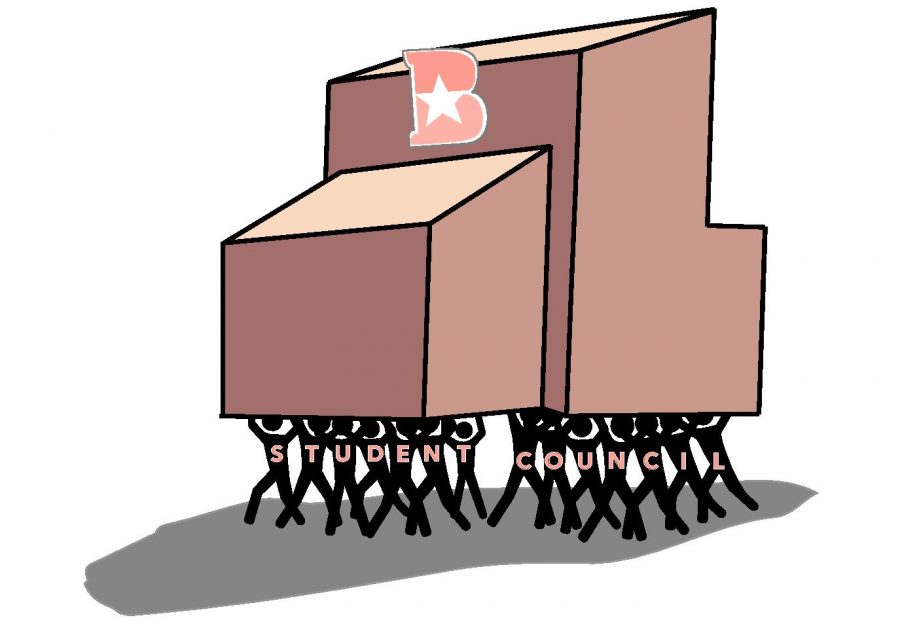Ellerbrock’s organizations work for greater cultural and self-awareness.
Counciling Cultures
As if overnight, the productions of Bowie events come together. The gardens seem to attend to themselves daily. Numerous posters appear throughout the halls every week. The hidden hands at work? Student council.
Made up of 30 junior and senior Presidents and Vice Presidents, student council teaches responsibility and leadership skills that prepare students for the future.
“Being in student council has definitely impacted my character for the better,” junior Kendall Oh said. “Having a great group of people to work with every week always brings me happiness, and it’s great to see our work come to a final product. Since I’ve been in student council, I’ve become more hardworking, responsible, and outgoing.”
Student council candidates had to demonstrate these qualities before even being elected. The campaign process, which took place in May, lasted about a month in total from brainstorming to Election Day, and each candidate was allowed to make four posters and 50 flyers in total for their campaign.
“We all helped each other and would hang out while we were making our posters, and we would make sure they looked really nice and asked each other our opinions,” senior Cade Blagden said. “Then it was just getting the word out to my friends. The thing I did that I think was the most successful is I had my stamping crusades, so I went to Office Depot and I got a stamp that said ‘Cade Blagden for President’ and I would go around during lunches and before school with candy and hand out candy and stamp their hands.”
While student council is largely responsible for the production of homecoming, Bowie Idol, Mr. Bulldog, and other charitable events, one ongoing responsibility includes managing the appearance of the campus.
“We maintain the beauty of this campus, which no other student council does at other schools,” student council advisor and social studies teacher James Ellerbrock said. “This campus is beautiful, and my theory is that when you walk out of my room and go in this hallway, is that hallway pretty? No. It’s concrete and steel—it’s not pretty. It almost looks like a prison or communistic apartments. So we clean the campus and we landscape the campus.”
Student council members meet after school every Thursday, where they plan upcoming functions, care for the grounds and clean the campus, and create posters to raise awareness for school events.
“Student council has taught me responsibility and teamwork,” Oh said. “In student council, you are responsible for showing up to every meeting and event, and you have to work diligently to get your job done in a quality manner. Being in an organization with lots of different people within Bowie has taught me how to work well with a team through communication, cooperation, and friendship.”
However, students not involved with student council can still learn about being active members of the community through a separate class taught by Ellerbrock: Contemporary Issues.
“It’s a salad. And a hot fudge sundae,” Ellerbrock said. “When I say it’s a salad, they learn history, films, art, music, sports, current events, health, religion—that’s a salad. It’s a hot fudge sundae because it’s an elective, it’s for fun, it’s for learning a lot of things that you probably are not learning in your regular classes. But more importantly, it is an initiative—a motivation to have my students for the rest of their lives want to learn things. I also send them to places here in the city. There are museums and an extraordinary new library downtown and so many Bowie kids think culture basically stops at Barton Creek Mall, which is unfortunate.”
Unlike other classes, grades in CI are determined by the amount of “points” received from certain assigned activities, and the number of points becomes the numerical grade up to a potential 100. Completion of an event usually entails visiting a cultural exhibition, showing proof of fulfilling the assignment, and earning anywhere from 10-40 points for each event.
“My favorite part of the class is how we earn points for our grade by going out and doing things around Austin,” senior Sophie Wolfe said. “I love this city and I like how Mr. E encourages his students to explore Austin and do things around the city that they wouldn’t usually know about or do.”
Although much of the class is based on outside-of-school activities, students also learn about social issues and other various topics in the classroom curriculum.
“We learn so much in this class, from classic 20th century music to history, present day situations, to interesting facts about things a lot of people don’t know about,” senior Justin Robarts said. “My favorite part about the class is going outside on the last B-day of the week and playing ultimate Frisbee with all my friends and just having a good time.”
While CI makes time for laid-back activities, it maintains the characteristics Ellerbrock continues to incorporate in all of his organizations: the drive to learn more about culture and individuals to ultimately work for a better society.
“Essentially I’m a history teacher, and I make connections to issues today, but actually those issues were 30-40-50-100 years ago,” Ellerbrock said. “We see the changes in what’s going on in this country right now—like women empowerment.”
Ellerbrock relates these issues back to current discussion in his classroom.
“Sometimes I will reach back to something maybe in the 60s, when I was your age, and it was very different for women back in those days,” Ellerbrock said. “Obviously it was very different for black people. Obviously it was very different for gay people. So I make the connections between where we are now, which may be still controversial, but it was also very controversial 30-40-50-60 years ago and hopefully we’re making some progress.”
